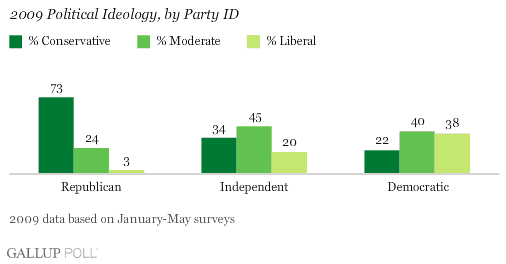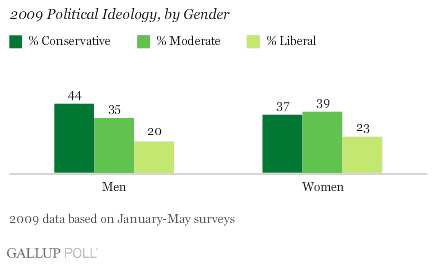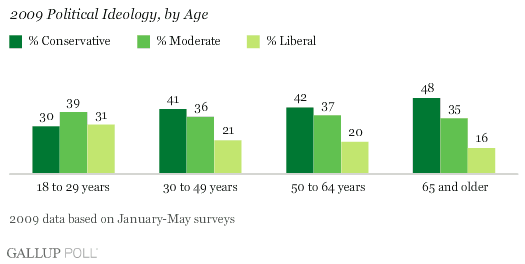According to a Gallup poll released today, twice as many Americans identify themselves as “conservative” over “liberal”, 40% to 21% respectively, with 35% of people calling themselves “moderate.” More interesting is the breakdown by party:

No surprise that Republicans are 73% conservative, but a surprising 22% of Democrats call themselves conservative as well. Also noteworthy is that more independents are conservative than liberal as well, though “moderates” are obviously the majority in this group.
The poll also found that women are more likely than men to be liberal or moderate, although conservative is still the most dominant for both:

And with the age breakdown, the poll write-up makes the claim that the tendency within in the 18-29 age range could have critical ramifications down the road. I would argue that the youth in this age range havethroughout the years always tended to be more liberal, and the fact that conservatives and liberals are in equal portions I actually call a win.

So what does this all mean? Well, for starters, it puts to rest the notion that with the election of Barack Obama and a Democratic majority, America became a center-left nation. Indeed, the numbers show America remains what I had always known it would: a center-right country. It should also put to rest the notion that conservatism is somehow dead – it’s doing twice as well as the alternative, and though you could rightly say that moderates are an even choicer voter bloc, it ought to be noted that “moderate” isn’t really an overriding political philosophy inasmuch that conservatism and liberalism could be defined to be, more a collection of views from both sides.
What it should show to the Republican Party is that they ditch conservatism at their own peril. Indeed, an opportunity exists within the 22% of conservative Democrats (and among the moderate Dems and moderate/conservative independents) to contrast the strong points of conservatism with that of their increasingly liberal opponent. To this end, I would urge the GOP to not make a willy-nilly mad dash toward what they think is the center, but instead reinforce the three core principles that sit at the heart of conservatism: fiscal responsibility, limited government, and a strong national defense.
Does that mean moderates don’t have a place in the Republican Party? Of course not, and no one is seeking to kick them out, no matter what others might try to tell you. Putting them in the driver’s seat to the exclusion of conservatives, though, would be a mistake, as it would clearly alienate a broad swath of their base, who haven’t been squeamish about supporting a third party candidate (see: Ross Perot) and probably wouldn’t in the future. In addition, although such a move might make some feel good, it probably wouldn’t peel off a significant number of independents to make up for the lost conservative support.
Ed Morrissey argues that this trend may indicate a further polarization of America along ideological lines, and there is some merit in what he says. But one thing is clear: rumors of conservatism’s death have been greatly exaggerated. Conservatism is alive and well, and, sorry folks, it’s not going anywhere.









Posted on June 15, 2009
0